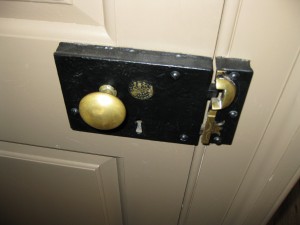 During Chip Falcon’s Road Trip we visited Colonial Williamsburg, and you may have seen my slideshow of the doors and hardware there. I received quite a few questions from readers about the hardware at CW, so I sent an email to the Architectural Research Department there and I got a return email from Mr. Kenneth Schwarz, whose title is Blacksmith, Master of the Shop. Ken has been a wonderful source of information about the hardware at CW, and I’m looking forward to meeting him and hopefully getting a behind-the-scenes tour the next time I’m there.
During Chip Falcon’s Road Trip we visited Colonial Williamsburg, and you may have seen my slideshow of the doors and hardware there. I received quite a few questions from readers about the hardware at CW, so I sent an email to the Architectural Research Department there and I got a return email from Mr. Kenneth Schwarz, whose title is Blacksmith, Master of the Shop. Ken has been a wonderful source of information about the hardware at CW, and I’m looking forward to meeting him and hopefully getting a behind-the-scenes tour the next time I’m there.
In the meantime, here is Ken’s email response to some of the questions I forwarded to him:
“Our mission at Colonial Williamsburg is to restore the Historic Buildings that survive in Williamsburg, reconstruct those that are missing, and to recreate the character of the Colonial Capitol. Our Historic Trades Department has the additional mission of researching, and preserving the hand skills of the period, and employing those skills in the manufacture and maintenance of objects needed in the restoration and operation of the Historic Area. All of this is done in support of our educational mission to teach the early history of the United States.
In the Anderson Blacksmith Shop we produce most of the ironware needed in the town – tools, household furnishings, agricultural implements, and hardware for buildings and vehicles. Our current project is the reconstruction of a coffeehouse to which we have contributed the nails, hinges, locks and latches, and other miscellaneous hardware. We do also have a brass foundry that produces any brass hardware necessary in the town.
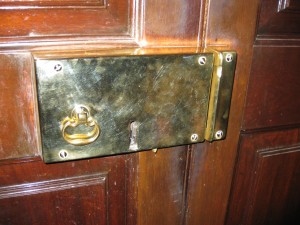 In the past, Colonial Williamsburg purchased hardware from licensed manufacturers of reproduction hardware, but as our standards improved, modern manufacturers were not able to produce what we need. Most of the historic hardware that we use is made in the blacksmith shop or foundry.
In the past, Colonial Williamsburg purchased hardware from licensed manufacturers of reproduction hardware, but as our standards improved, modern manufacturers were not able to produce what we need. Most of the historic hardware that we use is made in the blacksmith shop or foundry.
We do frequently make duplicate keys, along with new keys for new locks. As for salvaged items, we have an architectural fragments collection overseen by our department of collections. They have an extensive collection of construction materials collected from historic structures. We also have a department of archaeology that maintains a collection of historic objects that have been excavated in the town. Most of these old objects are used as study pieces, and they are reproduced for use. In that way, we are able to preserve the old objects, and allow the reproductions to be subjected to the wear and tear of everyday use.
As for security, we do have a department of security that oversees security and safety in the Historic Area, and the buildings are alarmed and monitored 24/7.
We do have periodic issues with modern codes in constructing and restoring historic structures. In many cases this means compromising historic integrity to meet safety standards, or working with the City of Williamsburg to secure variances for our programming.
The book “Early American Wrought Iron” by Albert Sonn is perhaps the best work on early hardware. In addition there are a series of articles on early hardware authored by Donald Streeter and published by the Association of Preservation Technology in their magazine “The Bulletin”. If you have access to JSTOR, you can find those articles.”
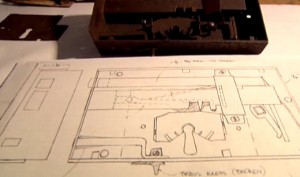 There’s a great video about the hardware made by the CW Blacksmith Shop for a coffeehouse that is currently being rebuilt there. You can access the video by going to the Coffeehouse Blog, finding the post called Coffeehouse Conversations 6 – Iron Works, and then following the instructions there. The video is listed under “Coffeehouse” in the video library, and is called Charlton’s Coffeehouse – Iron Works.
There’s a great video about the hardware made by the CW Blacksmith Shop for a coffeehouse that is currently being rebuilt there. You can access the video by going to the Coffeehouse Blog, finding the post called Coffeehouse Conversations 6 – Iron Works, and then following the instructions there. The video is listed under “Coffeehouse” in the video library, and is called Charlton’s Coffeehouse – Iron Works.
If you’re a member of the Door & Hardware Institute and you’d like to read more about Ken and his work at CW, go to www.dhi.org and download the article from the May 2007 issue of Door & Hardware Magazine called Hardware the Old-Fashioned Way, by Jess Madden.
With much appreciation to Mr. Kenneth Schwarz, Blacksmith, Master of the Shop, Colonial Williamsburg.
You need to login or register to bookmark/favorite this content.

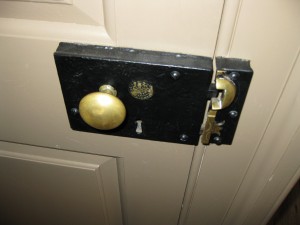

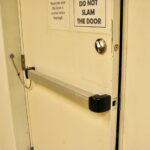
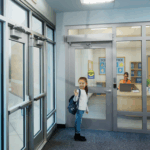

Lori –
When I started in this crazy business back in 1967, I had the good fortune
of having a mentor who actually supplied the hardware on the original
renovations to Colonial Williamsburg. His name was W. Littleton Henry and
he worked for Tom Jones Hardware in Richmond, VA back in the 1930’s.
The original brass rim locks were manufacturered to CW’s standards by
Folger Adam in Joilet, IL. I know, they manufactured jail hardware!. At
Pleasants Hardware, we stocked #1 and #2 rim locks with knob x drop ring
and also knob x knob. You could get an option for a Schlage rim cylinder
to give you a pin tumbler key KA to other doors. Pleasants also stocked
brass and brass/black rim locks by Russell and Erwin (568 model I think) and
also Baldwin started making brass rim locks that Pleasants stocked.
You know, you need a life away from bathrooms and hardware!!!
I love to read your postings.
Bruce
I am glad you enjoyed Colonial Williamsburg. They have always been very gracious and helpful to me and I have benifited grately.
Something you may like to know, I am completeing a book for Bauer & Dean titled American Doors, which covers the 17th,and 18th cuturies though Greek Revival. It is a Pattern Book of styles and includes hardware. The book will be out December 2012, but if there is something that interests you I cold send sample droughts.
To see more of my work please go to my website and click on Pattern Books. You won’t be
disappointed.
In Christ,
Peter Joel Harrison
Tom Jones is my Dad (1922-1982). Lit Henry, as with all my Dad’s and Grandfather’s employees, was one of the best hardware men anywhere…
Wow Chris – what a small world. Are you in the door and hardware business?
Looking back, I should have given more thought to taking the business (my Grandfather founded it back in 1922)…I became a teacher instead. Dad gave up the retail business in 1970, dealing only in contract hardware. He sold the business in 1977, but remained on the Board.
Ironically, he and Jimmy Hatcher (at Pleasants) were best friends.
And yes, it is a small world.
It seems like quite a few people enter this business by following in a parent’s footsteps.
I sent an email to Bruce Young, who left the comment about your father’s business, and I think he was going to email you.
Alas, things have changed since the good old days.
I look forward to it. Unfortunately, Dad could never have competed with Wal-Mart, Lowe’s, and that crowd. He hung on to those “good old days” as long as he could.
Hello,
I recently purchased a 30-year old home which has a gorgeous Williamsburg reproduction solid brass rim lock (knob to knob), no outside cylinder which had a large bit key. Unfortunately during the first day I moved in, the movers removed the key from the lock and we never found it again. I am desperately trying to get a duplicate key made but the local locksmith can not help. Do you have any suggestions? I can send a photo of the lock if that would help.
Thank you for any courtesies extended to me.
Kay
Hi Kay –
If you can send me some photos of the lock I may be able to help. lori.greene@allegion.com
– Lori
changed front door to modern fiberglass type. HAVE LARGE WILLIAMSBURG LOCK WITH ALL hardwear. anybody interested, ill send pics if requested
I’m interested if you still have it. You’re welcome to call me at 513-235=7668.
Hi Michael –
I think Gordon has sold his lock.
– Lori
Hi! I would like to see the lock you have, Gordon. I have an old Folger Adam that needs some parts and my local locksmiths don’t think they can help. I’d love to find parts but if that fails I will need to buy another one!
Anita
Thank you! If anybody knows how to locate these locks please let me know. Much appreciated!
I have a complete working Folger Adam solid brass Colonial Williamsburg authorized reproduction rim lock purchased in 1960 from Colonial williamsburg. If you are interested let me know.
Hello .. My name is michael and i have three or four of these sets of locks ! of interested e-mail me at mdholland3@hotmail.com
mine are nine and seven eighth by five and three quarters ! I have a set that came off of double doors and a couple other doors! I have four or five of them that came out of a demo that i thought were really nice so i saved them! they say an aproved williamsburg brass rim lock reproduced by folger adam co joliet illinois on the gold sticker on back and also stamped into the bottom of the brass.
Hello to all. My name is Sandy Luebs and my dad Ralph worked for Folger Adam for many, many years. One of my favorite memories are the Williamsburg keys he brought home for us kids.
Hi Sandy! Welcome!
– Lori